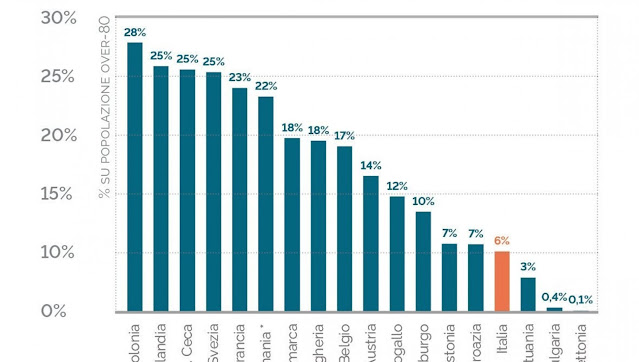The anti-Covid vaccination has gone on for almost a year now, but the pandemics just seems never to give us pause! On the news we hear about thousands and thousands of deaths every day. Politicians and scientists seem very worried and the same is for all of us. In 2020, at the beginning of the Covid pandemics, we were all hopefully waiting for a vaccine to come out, which may have solved all our issues. Unfortunately, we still are living in a very complex situation, though in Italy at least, the majority of people have been vaccinated.
We also
hoped we would become better thanks to
the experience of lockdown and of the emergency, but apparently we haven’t. Whenever we turn the TV on or surf the Net
for news, we have to cope with the aggressiveness of angry people. The protests often turn into violent riots, as if we were
living a sort of civil war. Anti-vaccine, anti-green pass, people who even deny the existence of Covid behave
very violently and can become scary.
I’ve
recently watched an interview with Italian Minister of Health, Roberto Speranza, to try to
understand something more about vaccines.
Here are some of his answers to the interviewer’s questions.
What does the vaccination campaign
foresee and what is its objective?
The objective of the vaccination
campaign of the population is to achieve high vaccination coverage with the
completion of the currently authorized cycles to reduce
the circulation of the virus and the development of variants to effectively
prevent the onset of serious pathology and deaths. The campaign started on December 27 in Italy
and Europe with the vaccine day (effectively on December 31, 2020).
Vaccines
are offered free of charge to the entire population, according to an order of
priority, which takes into account the risk of disease, the types of vaccine
and their availability.
How effective are vaccines?
In the last 30 days in Italy there is a higher incidence of cases diagnosed
in unvaccinated people. Vaccine efficacy in preventing any symptomatic or asymptomatic diagnosis of
COVID-19 in fully vaccinated people decreased from 89% to 76% during the
epidemic phase with prevalent delta variant. However, vaccination efficacy in
preventing hospitalization (92%), hospitalization in intensive care (95%) or
death (91%) in the epidemic phase with prevalent delta variant remains high.
Are vaccines safe?
Yes. Vaccines
are authorized only after a careful evaluation of the safety profile based on
the studies carried out in the trial phase. However, the studies are in
continuous development even if the experimental phase is over.
Who were the first people to be
vaccinated and who should have the urgency to get vaccinated?
The first were health and social care workers, residents and staff of residential facilities for the elderly people.
The political and health systems have decided to divide the urgency of vaccination according to categories
Category 1 : the extremely vulnerable, people suffering from specific conditions who present a particularly high risk of developing severe or lethal forms of Covid-19.
The severely disabled people, consequently also their cohabiting family members and caregivers who provide continuous assistance.
Category 2: People aged 70 to 79 years
Category 3: People aged between 60 and 69
Category 4: People with comorbidities aged <60 years, without that connotation of severity reported for high fragility
Category 5: Rest of the population aged <60 years up to 16 years.
Can children and young people be vaccinated?
Among the vaccines currently
authorized in Italy, (BionNtech /Pfizer) and (Moderna) can be administered
under 18 years of age (from 12 years of age).
Probably they will soon also approved for younger children. They have been experimenting them and the results are reassuring.
How long will it take for anyone to be protected from Covid19 after been vaccinated?
Clinical studies have shown a very high efficacy of vaccines, respectively, after one week and two weeks after the second dose.
If I have already had Covid, do I have to do the whole vaccination cycle?
For people
who have already had the infection, which occurred symptomatically or
asymptomatically, it is possible to consider the administration of a single
dose, preferably within 6 months of infection and in any case no later than 12
months after recovery.
What about the booster (third dose) ?
In Italy we
have started administering a booster dose to category 1 and 2 mentioned above,
since it has been demonstrated that our immunitary defence against Covid diminishes
after 6 months from the second shot.
Mattia, 3sc





No comments:
Post a Comment